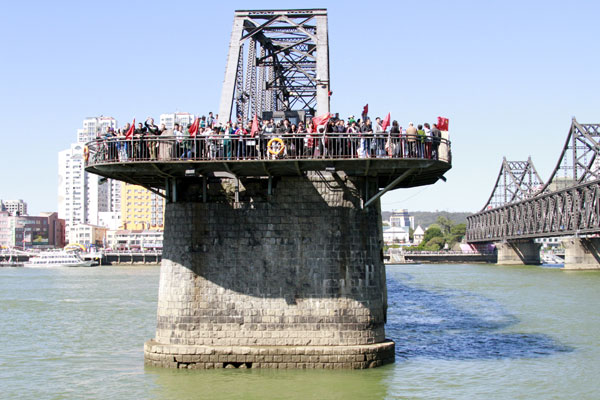Neighborly visits on border
 |
|
Visitors stand on the Broken Bridge on the Dandong side to get a view of the DPRK. [Photo/China Daily] |
Waterfowl ignore the rules though.
A Dandong saying goes: "Ducks go to the DPRK to eat fish and return to China to lay eggs."
(Yalu, incidentally, translates as "duck green".)
Visitors to Dandong's riverside markets can buy DPRK items, such as chopsticks, ethnic attire and art.
That morning, we stood meters from the border at the Ming Dynasty (1368-1644) Great Wall's easternmost terminus, Hushan.
The ancient barricade previously separating ethnic Manchu and Han people is a stone's throw from the modern fence delineating two contemporary countries-and worlds.
Signs warn against crossing the fence, wading and speaking or exchanging items with people across the barrier.
A Chinese guard watched over the open gate of the flimsy fence beneath which bobbed a wooden rowboat.
From the wall, visitors can view the DPRK's 4.7-square-kilometer Fish Wing Island. Its nearly 3,000 villagers plant corn for the military.
Some of the Yalu's islets belong to China. Others are its neighbor's.
Dandong exists not only as a tourism destination but also as a city because of this proximity.
Dynastic rulers restricted residency since it was a frontier settlement. Most inhabitants were involved in border patrol or logistics.
Han Dynasty (206 BC-AD 220) emperor Wudi declared the link from the settlement to the Guangxi Zhuang autonomous region as the first of three Maritime Silk Road routes. Emperors also used it to ship local timber to Japan.
The Cold War brought influxes to the still-sparsely populated border. The forest forged a city.
The border juxtaposition continues to draw outsiders today.
Dandong hosts about 8,000 expatriates, mostly from the DPRK.
And 80,000 people from the Republic of Korea visit the greater Changbai Mountain area annually, Chinese tourism officials say.
Many come to Dandong to peek over the border. It's one of a few Chinese cities where they can get visas on arrival.
They typically then drive from the city to Jilin province's Ji'an, with the Yalu to their right and the Changbai Mountains to their left.














